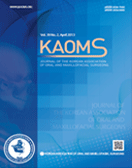Journal of the Korean Association of Oral and Maxillofacial Surgeons
- P-ISSN2234-7550
- E-ISSN2234-5930
- SCOPUS, KCI, ESCI
 ISSN : 2234-7550
ISSN : 2234-7550
Effect of rotation bump on removal torque of orthodontic mini-implants
Abstract
Objectives: This study is designed to evaluate the mechanical stability of orthodontic mini-implants with vertical grooves in rabbits. Materials and Methods: This study was done from March 2011 to February 2012 in Dental Research Institute of Seoul National University. Thirty-two mini-implants in the control group and 32 in the rotation bump (RB) group were inserted in the tibias of 16 rabbits and were removed after two weeks and four weeks, respectively. The maximum insertion torque (MIT), maximum removal torque (MRT), torque ratio (TR) of MRT to MIT and removal angular momentum (RAM) were all measured at the time of removal. Results: There were no significant differences between the two groups in MIT and MRT at two weeks or four weeks. However, TR and RAM at four weeks in the RB group were significantly higher than in the control group (P<0.05). TR of the RB group was significantly increased at four weeks (P<0.05). In both groups, RAM at four weeks was significantly higher than at two weeks (P<0.05). Conclusion: These results suggest that RB of the mini-implant could provide resistance to the removal rotation, although it did not increase the MRT.
- keywords
- Mini-implant, Rotation bump, Torque, Torque ratio, Angular momentum
- Downloaded
- Viewed
- 0KCI Citations
- 0WOS Citations